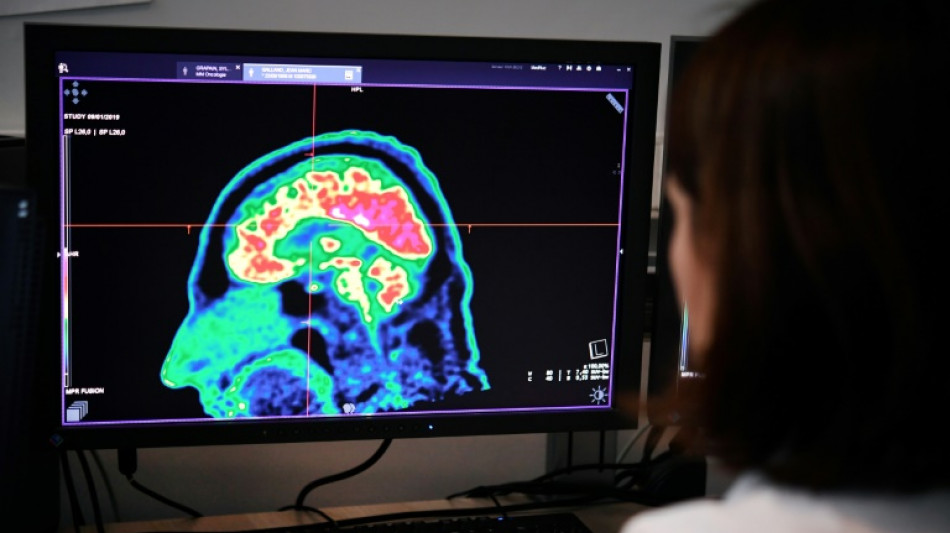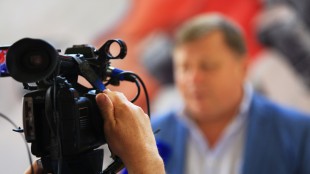
-
 Arteta urges Arsenal to break New Year Premier League curse
Arteta urges Arsenal to break New Year Premier League curse
-
Norway closes in on objective of 100% electric car sales

-
 Dani Alves invests in Portuguese third division club
Dani Alves invests in Portuguese third division club
-
Trump says US will 'come to their rescue' if Iran kills protesters

-
 Orsted files lawsuit against US suspension of wind turbine leases
Orsted files lawsuit against US suspension of wind turbine leases
-
South Koreans now free to read North's newspaper, once banned as seditious

-
 Stocks make bright start to 2026
Stocks make bright start to 2026
-
Bashir, Potts in England squad for final Ashes Test

-
 Argentina topple Spain for winning United Cup start
Argentina topple Spain for winning United Cup start
-
Champions Narvaez and Ruegg to defend Tour Down Under titles

-
 'Are they OK?': desperate search for the missing after Swiss fire
'Are they OK?': desperate search for the missing after Swiss fire
-
'Are they OK?': desparate search for the missing after Swiss fire

-
 Asia stocks make bright start to 2026
Asia stocks make bright start to 2026
-
Miami and Houston stretch NBA win streaks to four games

-
 Swiss investigators rush to identify victims of New Year's fire
Swiss investigators rush to identify victims of New Year's fire
-
Bicycle kick king El Kaabi is new AFCON hero for hosts Morocco

-
 What to look out for in the Premier League transfer window
What to look out for in the Premier League transfer window
-
Maduro elusive on US attack, open to dialogue

-
 Venus Williams gets Australian Open wildcard aged 45
Venus Williams gets Australian Open wildcard aged 45
-
Trump blames bruised hand on aspirin, denies falling asleep

-
 Dress for success: Mexican president's ideological attire
Dress for success: Mexican president's ideological attire
-
Best of frenemies: Saudi, UAE rivalry bursts into view

-
 'Positive signs' on hospitalised Australian cricket great Martyn
'Positive signs' on hospitalised Australian cricket great Martyn
-
North Korean leader's daughter in first visit to symbolic mausoleum

-
 The Crans-Montana fire: a Swiss tragedy that raises questions
The Crans-Montana fire: a Swiss tragedy that raises questions
-
Around 40 killed as fire ravages Swiss ski resort New Year party

-
 Australia's Khawaja to retire after Ashes finale, slams 'racial stereotyping'
Australia's Khawaja to retire after Ashes finale, slams 'racial stereotyping'
-
Black Book Research Publishes the 2026 State of Global Digital Healthcare Technology

-
 IRS Can Pursue Past 1099 Income Years Later - Clear Start Tax Explains How Long Contractors Stay Exposed
IRS Can Pursue Past 1099 Income Years Later - Clear Start Tax Explains How Long Contractors Stay Exposed
-
Metallic Minerals Provides Corporate Update and Responds to Recent Market Activity

-
 Investar Holding Corporation Announces Completion of Wichita Falls Bancshares, Inc. Acquisition
Investar Holding Corporation Announces Completion of Wichita Falls Bancshares, Inc. Acquisition
-
Golden Minerals Company Substantially Reduces Liabilities in Mexico

-
 Tocvan Provides 2025 Year in Review
Tocvan Provides 2025 Year in Review
-
WeTrade Supports UNICEF to Improve Children's Wellbeing in Indonesia

-
 Evotec Appoints Dr. Sarah Fakih as EVP, Head of Global Communications and Investor Relations
Evotec Appoints Dr. Sarah Fakih as EVP, Head of Global Communications and Investor Relations
-
Frank accepts 'boring' jibes from Spurs fans after Brentford stalemate

-
 Guardiola vexed by Man City's sloppy finishing in Sunderland draw
Guardiola vexed by Man City's sloppy finishing in Sunderland draw
-
Tears and stunned silence at vigil for Swiss fire victims

-
 Wembanyama to miss Spurs' NBA game Friday at Indiana: reports
Wembanyama to miss Spurs' NBA game Friday at Indiana: reports
-
Man City charge stalls at Sunderland, Liverpool held by Leeds

-
 Man City's title bid dented by Sunderland stalemate
Man City's title bid dented by Sunderland stalemate
-
Australia's Khawaja announces retirement from international cricket

-
 Niners seek win for home-field playoff edge into Super Bowl
Niners seek win for home-field playoff edge into Super Bowl
-
New York mayor Mamdani pledges left-wing success after taking office

-
 Slot frustrated by blunt Liverpool in Leeds stalemate
Slot frustrated by blunt Liverpool in Leeds stalemate
-
Toothless Liverpool held by Leeds

-
 Dozens killed as fire ravages Swiss ski resort New Year party
Dozens killed as fire ravages Swiss ski resort New Year party
-
K-pop stars BTS to release album in March ahead of world tour

-
 Fresh clashes kill six in Iran cost-of-living protests
Fresh clashes kill six in Iran cost-of-living protests
-
Nigeria kicks off new tax regime vowing relief for low earners

| RBGPF | -0.37% | 80.75 | $ | |
| AZN | -0.63% | 91.93 | $ | |
| RELX | -1.71% | 40.42 | $ | |
| SCS | 0.12% | 16.14 | $ | |
| BTI | 0.12% | 56.62 | $ | |
| RYCEF | 0.13% | 15.51 | $ | |
| CMSC | -0.15% | 22.65 | $ | |
| GSK | -0.53% | 49.04 | $ | |
| BP | -0.06% | 34.73 | $ | |
| VOD | -0.15% | 13.21 | $ | |
| NGG | -0.54% | 77.35 | $ | |
| RIO | -0.61% | 80.03 | $ | |
| CMSD | 0.09% | 23.15 | $ | |
| BCE | 1.05% | 23.82 | $ | |
| JRI | 0.22% | 13.61 | $ | |
| BCC | -0.26% | 73.6 | $ |

First child cured of rare brain tumour 'offers real hope'
When Lucas was diagnosed with a rare type of brain tumour at the age of six, there was no doubting the prognosis.
French doctor Jacques Grill gets emotional when he remembers having to tell Lucas's parents that their son was going to die,
However, seven years later, Lucas is now 13 years old and there is no trace of the tumour left.
The Belgian boy is the first child in the world to have been cured of brainstem glioma, a particularly brutal cancer, according to the researchers who treated him.
"Lucas beat all the odds" to survive, said Grill, head of the brain tumour programme at the Gustave Roussy cancer centre in Paris.
The tumour, which has the full name diffuse intrinsic pontine glioma (DIPG), is diagnosed every year in around 300 children in the United States, and up to 100 in France.
Ahead of International Childhood Cancer Day on Thursday, the medical community has praised advances that mean 85 percent of children now survive more than five years after being diagnosed with cancer.
But the outlook for children with the DIPG tumour remains grim -- most do not live a year beyond diagnosis. A recent study found that only 10 percent were alive two years on.
Radiotherapy can sometimes slow the rapid march of the aggressive tumour, but no drug has been shown to be effective against it.
- 'No other case like him' -
Lucas and his family travelled from Belgium to France so that he could become one of the first patients to join the BIOMEDE trial which tests potential new drugs for DIPG.
From the start, Lucas responded strongly to the cancer drug everolimus, which he was randomly assigned.
"Over a series of MRI scans, I watched as the tumour completely disappeared," Grill told AFP.
But the doctor did not dare stop the treatment regimen -- at least until a year and a half ago, when Lucas revealed he was no longer taking the drugs anyways.
"I don't know of any other case like him in the world," Grill said.
Exactly why Lucas so fully recovered, and how his case could help other children like him in the future, remains to be seen.
Seven other children in the trial survived years after being diagnosed, but only Lucas's tumour completely vanished.
The reason these children responded to the drugs, while others did not, was likely due to the "biological particularities" of their individual tumours, Grill said.
"Lucas's tumour had an extremely rare mutation which we believe made its cells far more sensitive to the drug," he added.
- Reproducing Lucas -
The researchers are studying the genetic abnormalities of patients' tumours as well as creating tumour "organoids," which are masses of cells produced in the lab.
"Lucas's case offers real hope," said Marie-Anne Debily, a researcher supervising the lab work.
"We will try to reproduce in vitro the differences that we have identified in his cells," she told AFP.
The team want to reproduce his genetic differences in the organoids to see if the tumour can then be killed off as effectively as it was in Lucas.
If that works, the "next step will be to find a drug that has the same effect on tumour cells as these cellular changes," Debily said.
While the researchers are excited about this new lead, they warned that any possible treatment is still a long way off.
"On average, it takes 10-15 years from the first lead to become a drug -- it's a long and drawn-out process," Grill said.
David Ziegler, a paediatric oncologist at Sydney Children's Hospital in Australia, said that the landscape for DIPG has dramatically changed over the last decade.
Breakthroughs in the lab, increased funding and trials such as BIOMEDE make "me convinced that we will soon find that we are able to cure some patients," Ziegler told AFP.
D.Kaufman--AMWN



